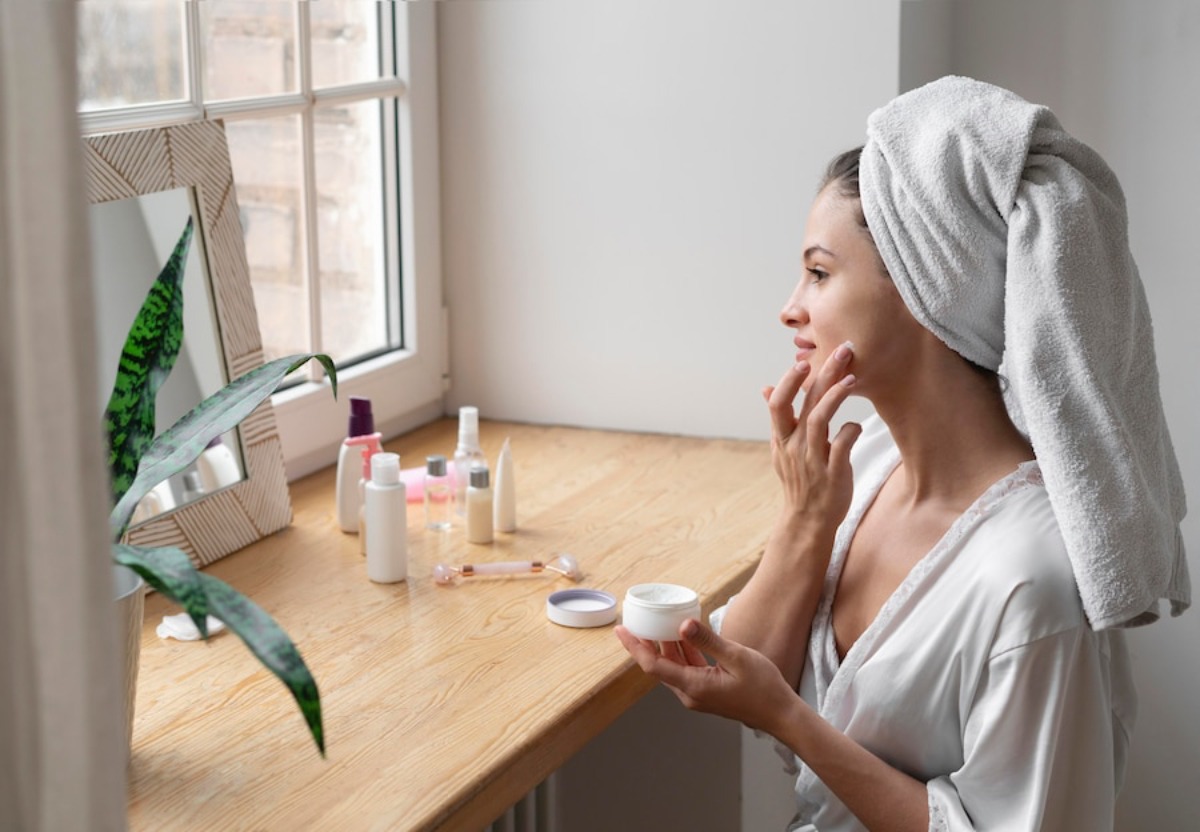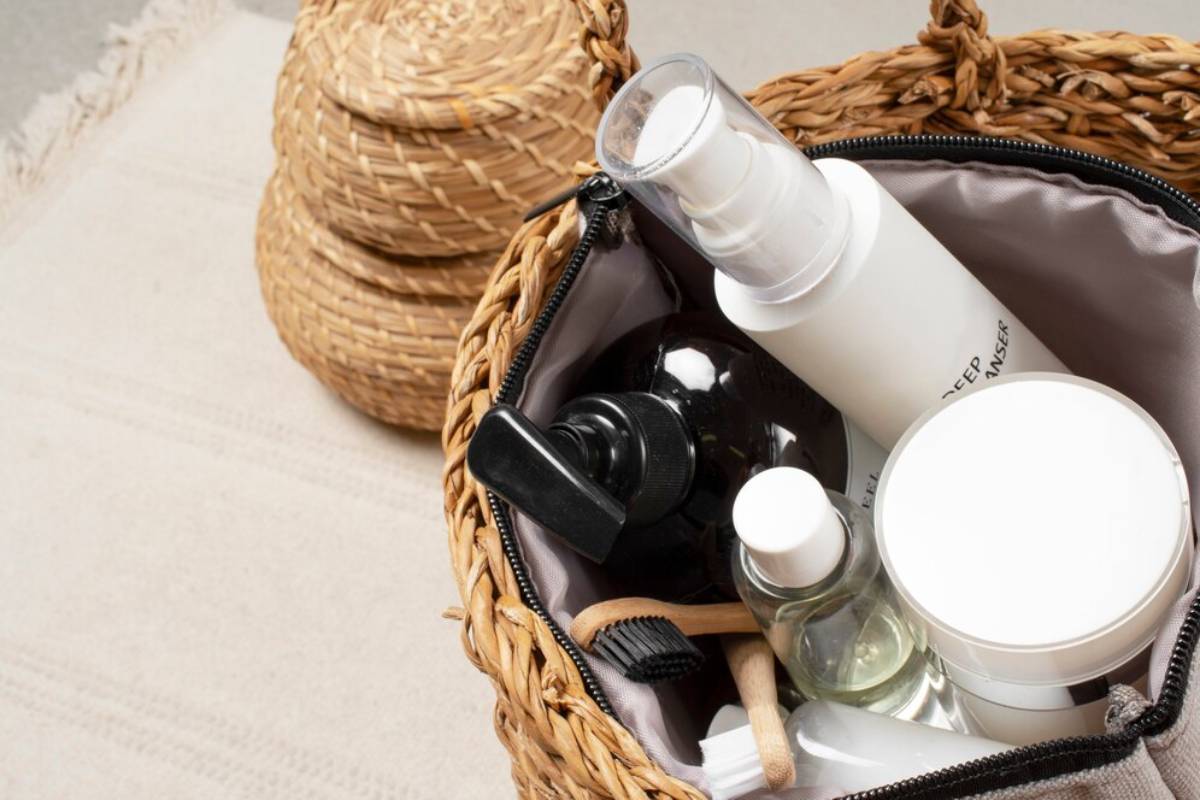
How to Transition Your Skincare Routine with Seasons
Changing your skincare routine with the seasons is key to keeping your skin healthy and glowing all year. As the climate changes, your skin responds to different temperatures, humidity, and stress. Ignoring these changes can lead to dryness, breakouts, or dullness.
In this guide, we’ll look at why you should change your skincare routine with the seasons. We’ll share easy steps to protect your skin and give expert tips for different skin types. Whether braving the cold winter winds or basking in the summer sun, this guide will help you maintain glowing skin all year.
Pro Tip
Your skin’s needs change with the seasons. Adjust your skincare routine to keep it hydrated, balanced, and protected all year long.
Quick Guide: Seasonal Skincare Transitions
- Winter: Use rich moisturisers, creamy cleansers, and a humidifier. Limit exfoliation.
- Summer: Apply SPF 30+, switch to lightweight gel moisturisers, and use antioxidants.
- Spring & Autumn: Adjust hydration—lighter in spring, richer in autumn. Add antioxidants in spring and retinol in autumn.
- Tailor for Skin Type:
- Dry: Hydrating serums, no alcohol-based toners.
- Oily: Niacinamide, salicylic acid, mattifying products.
- Sensitive: Fragrance-free, soothing ingredients.
- Avoid Mistakes: Never skip sunscreen, don’t overload products, and adjust based on skin changes.
Important
Healthy skin is all about consistency and adaptability. Adjust your routine, listen to your skin, and embrace seasonal skincare changes for a radiant glow all year long!
Why Seasonal Skincare Matters
Your skin is dynamic and responds to environmental changes. Changing your skincare routine with the seasons helps keep your skin balanced. It also prevents common skin issues that come with each season.
1. Protects Skin Barrier Function
Temperature swings, humidity shifts, and more UV exposure can harm the skin’s natural barrier. Adjusting your routine helps maintain a strong, resilient barrier.
2. Prevents Seasonal Skin Issues
- Winter: Dryness, flakiness, and sensitivity
- Summer: Oiliness, sunburn, and clogged pores
- Spring/Fall: Transition periods often trigger inflammation or breakouts
3. Enhances Product Efficacy
Products that work well in summer may not provide the same benefits in winter. Switching formulas based on seasonal needs ensures that your skincare products work optimally.
The Science Behind Seasonal Skin Changes
Impact of Weather on Skin
A British Journal of Dermatology study found that seasons change skin hydration, pH, and lipid levels. In winter, low humidity dries out the skin. In summer, the heat boosts oil production, which can cause breakouts.
Humidity and Skin Response
- High Humidity: Increases sweat and oil production, potentially leading to clogged pores and acne.
- Low Humidity: Depletes moisture, causing dryness and increased sensitivity.
Step-by-Step Guide to Seasonal Skincare Transition

1. Winter Skincare Routine: Lock in Hydration
Hydration is Key:
- Use a Rich Moisturiser: Opt for a thick, cream-based formula with ceramides or shea butter to lock in moisture.
- Use Hydrating Serums: Pick serums that have hyaluronic acid, glycerin, or niacinamide. These ingredients help stop dehydration.
Gentle Cleansing:
- Switch to a Creamy Cleanser: Ditch harsh foaming cleansers. Use a gentle, hydrating cleanser that maintains the skin’s natural oils.
Exfoliate with Caution:
- Limit Frequency: Excessive exfoliation in winter can lead to irritation. Stick to exfoliating once or twice weekly with a mild chemical exfoliant like lactic acid.
Additional Winter Tip: Use a humidifier indoors to maintain moisture in the air, preventing your skin from becoming overly dry.
2. Summer Skincare Routine: Prioritise Protection
Sunscreen is Non-Negotiable:
- Daily Sunscreen Use: As the summer sun beckons, the risk of sunburn and premature ageing lurks. Apply a broad-spectrum sunscreen with at least SPF 30 every morning, regardless of cloud cover.
- Reapply Frequently: Reapply every two hours, especially if swimming or sweating.
Lightweight Moisturisers:
- Switch to Gel-Based Formulas: Use a light, water-based moisturiser. This helps avoid clogged pores and keeps your skin feeling fresh.
Control Excess Oil:
- Mattifying Products: Use oil-free moisturisers and mattifying primers. They help control shine and lower the chance of breakouts.
Summer Tip: Use antioxidant-rich products like vitamin C. They help neutralise free radicals from sun exposure.
3. Spring and Autumn Skincare Adjustments
Spring: Refresh and Prepare
- Introduce Antioxidants: As the weather warms, use antioxidant serums like vitamin C or green tea extract. They help protect your skin from environmental stress.
- Lighten Up Moisturisers: Switch from thick creams to light hydrating lotions. This helps avoid congestion.
Autumn: Repair and Rejuvenate
- Focus on Skin Renewal: Use ingredients like retinol or peptides to repair summer damage and promote cell turnover.
- Hydrate Deeply: Begin reintroducing richer moisturisers to prep your skin for colder weather.
Customising Your Skincare for Different Skin Types
1. Dry Skin
- Winter: Layer hydrating serums and thicker moisturisers. Avoid alcohol-based toners.
- Summer: Use a hydrating mist and switch to lightweight formulas to prevent clogged pores.
2. Oily/Acne-Prone Skin
- Winter: Opt for hydrating, non-comedogenic products to prevent stripping oils.
- Summer: Control excess oil with salicylic acid or niacinamide. Use a mattifying sunscreen.
3. Sensitive Skin
- Winter: Use fragrance-free, gentle formulas with calming ingredients like chamomile.
- Summer: Avoid harsh exfoliants and incorporate soothing aloe vera or allantoin.
Advanced Insights and Expert Recommendations

1. Customised Skincare Plans
Talk to a dermatologist to create a routine that changes with the seasons. Tailored skincare plans ensure optimal results while addressing individual skin concerns.
2. Incorporate Adaptogens in Skincare
Adaptogens such as ashwagandha and ginseng help balance skin problems caused by stress, which often get worse with seasonal changes.
3. Monitor Indoor Humidity Levels
Low indoor humidity during winter can compromise skin hydration. Invest in a humidifier to maintain optimal moisture levels.
Common Mistakes to Avoid
1. Neglecting Sunscreen in Winter
UV rays penetrate clouds and cause damage year-round. Always wear sunscreen, even on overcast days.
2. Overloading Your Skin with Products
Switching to too many products at once can overwhelm the skin. Transition gradually to avoid irritation.
3. Ignoring Seasonal Skin Signals
Failing to observe how your skin reacts to seasonal changes may lead to ineffective skincare routines.
Lifestyle Factors That Enhance Seasonal Skincare
1. Hydration and Nutrition
Drink ample water and include antioxidant-rich foods like berries and leafy greens to nourish your skin from within.
2. Stress Management
Incorporate stress-relief practices like meditation and deep breathing to prevent stress-induced skin flare-ups.
3. Consistent Sleep Patterns
A regular sleep schedule helps your skin repair and regenerate. This also helps your skin adjust to changes in the seasons.
Frequently Asked Questions (FAQs)
1. How do I know when to adjust my skincare routine for the seasons?
Pay attention to changes in your skin texture, hydration levels, and oiliness. It’s time to transition when your usual products no longer deliver the same results.
2. Can I use the same cleanser throughout the year?
Not necessarily. In winter, switch to a creamy cleanser to prevent dryness, while in summer, opt for a lightweight gel or foam cleanser.
3. Is it okay to use retinol year-round?
Yes, but adjust the frequency. In summer, use retinol less frequently and apply sunscreen diligently to avoid sensitivity.
4. Do I need different moisturisers for summer and winter?
Yes. Creamy moisturisers are best for winter. In summer, use lighter gel-based ones to avoid clogged pores.
5. Can seasonal changes affect acne-prone skin?
Yes. Summer oil production can cause breakouts, but winter dryness may lead to inflammation. Adjust your routine accordingly.
Conclusion: Achieve Year-Round Radiance by Adapting to Seasonal Changes
Changing your skincare routine with the seasons helps keep your skin healthy and glowing year-round. Every season brings challenges. However, with a good routine, you can protect and keep your skin glowing.
Be consistent and flexible. Use a rich moisturiser in winter and prioritise SPF in summer. For best results, consider consulting a skincare expert to fine-tune your regimen.
Ready to make seasonal adjustments? Take control of your skincare. Enjoy beautiful, healthy skin no matter the weather. What seasonal changes will you incorporate into your routine this year?


